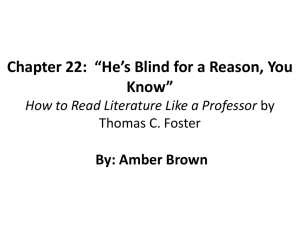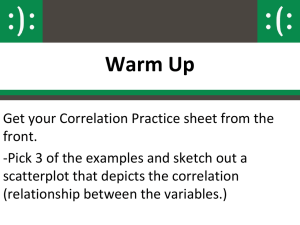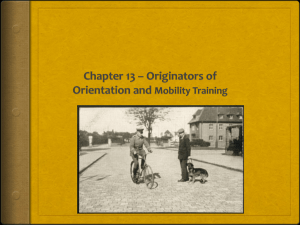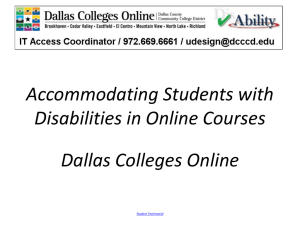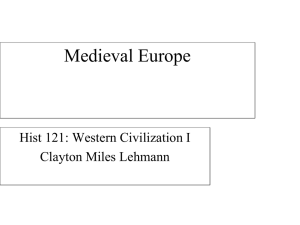Carver Cathedral-3
advertisement
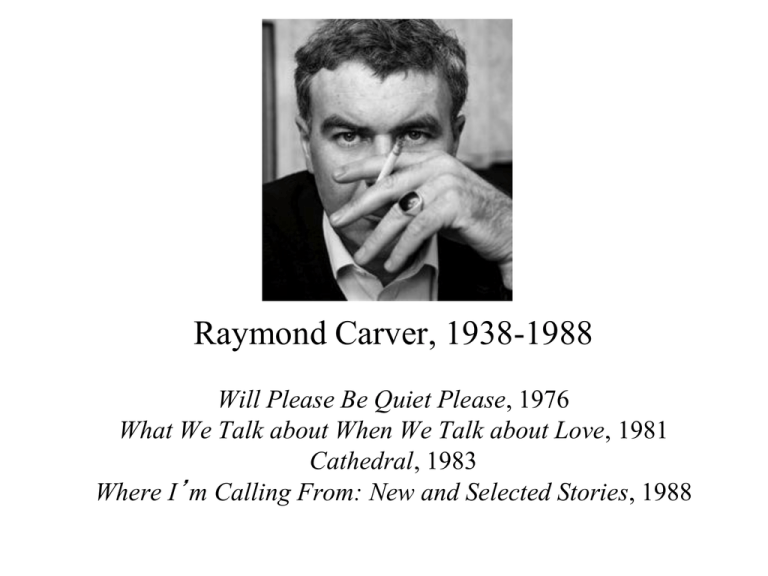
Raymond Carver, 1938-1988 Will Please Be Quiet Please, 1976 What We Talk about When We Talk about Love, 1981 Cathedral, 1983 Where I’m Calling From: New and Selected Stories, 1988 “Once all one could draw from Carver’s work was the moral that when life wasn’t cruel it was silly. In several key stories since 1980, he has revealed to readers and characters alike that though they have long suffered the conviction that life is irredeemably trivial, in truth it is as profound as their wounds, and their substance is as large as the loss they suffer.” Mark A. R. Facknitz, “’The Calm,’ ‘A Small Good Thing,’ and ‘Cathedral’: Raymond Carver and the Rediscovery of Human Worth.” Studies in Short Fiction 23.3 (1986): 287-296. Sober, with Tess Cathedral Raymond Carver This blind man, an old friend of my wife’s, he was on his way to spend the night. His wife had died. So he was visiting the dead wife’s relatives in Connecticut. He called my wife from his in-law’s. Arrangements were made. He would come by train, a five-hour trip, and my wife would meet him at the station. She hadn’t seen him since she worked for him one summer in Seattle ten years ago. But she and the blind man had kept in touch. They made tapes and mailed them back and forth. I wasn’t enthusiastic about his visit. He was no one I knew. And his being blind bothered me. My idea of blindness came from the movies. In the movies, the blind moved slowly and never laughed. Sometimes they were led by seeing-eye dogs. A blind man in my house was not something I looked forward to. That summer in Seattle she had needed a job. She didn’t have any money. The man she was going to marry at the end of the summer was in officers’ training school. He didn’t have any money, either. But she was in love with the guy, and he was in love with her, etc. She’d seen something in the paper: HELP WANTED—Reading to Blind Man, and a telephone number. She phoned and went over, was hired on the spot. She worked with this blind man all summer. She read stuff to him, case studies, reports, that sort of thing. She helped him organize his little office in the county social-service department. They’d become good friends, my wife and the blind man. On her last day in the office, the blind man asked if he could touch her face. She agreed to this. She told me he touched his fingers to every part of her face, her nose—even her neck! She never forgot it. She even tried to write a poem about it. She was always trying to write a poem. She wrote a poem or two every year, usually after something really important had happened to her. Paragraphs 3 and 4 When we first started going out together, she showed me the poem. In the poem, she recalled his fingers and the way they had moved around over her face. In the poem, she talked about what she had felt at the time, about what went through her mind when the blind man touched her nose and lips. I can remember I didn’t think much of the poem. Of course, I didn’t tell her that. Maybe I just don’t understand poetry. I admit it’s not the first thing I reach for when I pick up something to read. Anyway, this man who’d first enjoyed her favors, this officer-to-be, he’d been her childhood sweetheart. So okay. I’m saying that at the end of the summer she let the blind man run his hands over her face, said good-bye to him, married her childhood etc., who was now a commissioned officer, and she moved away from Seattle. But they’d keep in touch, she and the blind man. She made the first contact after a year or so. She called him up one night from an Air Force base in Alabama. She wanted to talk. They talked. He asked her to send him a tape and tell him about her life. She did this. She sent the tape. On the tape, she told the blind man she loved her husband but she didn’t like it where they lived and she didn’t like it that he was a part of the military-industrial thing. She told the blind man she’d written a poem and he was in it. She told him that she was writing a poem about what it was like to be an Air Force officer’s wife. The poem wasn’t finished yet. She was still writing it. The blind man made a tape. He sent her the tape. She made a tape. This went on for years. My wife’s officer was posted to one base and then another. She sent tapes from Moody AFB, McGuire, McConnell, and finally Travis, near Sacramento, where one night she got to feeling lonely and cut off from people she kept losing in that moving-around life. She got to feeling she couldn’t go it another step. She went in and swallowed all the pills and capsules in the medicine chest and washed them down with a bottle of gin. Then she got into a hot bath and passed out. Paragraphs 5 and 6. But instead of dying, she got sick. She threw up. Her officer—why should he have a name? he was the childhood sweetheart, and what more does he want?—came home from somewhere, found her, and called the ambulance. In time, she put it all on tape and sent the tape to the blind man. Over the years, she put all kinds of stuff on tapes and sent the tapes off lickety-split. Next to writing a poem every year, I think it was her chief means of recreation. On one tape, she told the blind man she’d decided to live away from her officer for a time. On another tape, she told him about her divorce. She and I began going out, and of course she told her blind man about it. She told him everything, or so it seemed to me. Once she asked me if I’d like to hear the latest tape from the blind man. This was a year ago. I was on the tape, she said. So I said okay, I’d listen to it. I got us drinks and we settled down in the living room. We made ready to listen. First she inserted the tape into the player and adjusted a couple of dials. Then she pushed a lever. The tape squeaked and someone began to talk in this loud voice. She lowered the volume. After a few minutes of harmless chitchat, I heard my own name in the mouth of this stranger, this blind man I didn’t even know! And then this: “From all you’ve said about him, I can only conclude—“ But we were interrupted, a knock at the door, something, and we didn’t ever get back to the tape. Maybe it was just as well. I’d heard all I wanted to. Now this same blind man was coming over to sleep in my house. The blind man arrives. My wife finally took her eyes off the blind man and looked at me. I had the feeling she didn’t like what she saw. I shrugged. I’ve never met, or personally known, anyone who was blind. This blind man was late forties, a heavy-set, balding man with stooped shoulders, as if he carried a great weight there. He wore brown slacks, brown shoes, a light-brown shirt, a tie, a sports coat. Spiffy. He also had this full beard. But he didn’t use a cane and he didn’t wear dark glasses. I’d always thought dark glasses were a must for the blind. Fact was, I wish he had a pair. At first glance, his eyes looked like anyone else’s eyes. But if you looked close, there was something different about them. Too much white in the iris, for one thing, and the pupils seemed to move around in the sockets without his knowing it or being able to stop it. Creepy. As I stared at his face, I saw the left pupil turn in toward his nose while the other made an effort to keep in one place. But it was only an effort, for that one eye was on the roam without his knowing it or wanting it to be. I said, “Let me get you a drink. What’s your pleasure? We have a little bit of everything. It’s one of our pastimes.” Every night I smoked dope and stayed up as long as I could before I fell asleep. My wife and I hardly ever went to bed at the same time. When I did go to sleep, I had these dreams. Sometimes I’d wake up from one of them, my heart going crazy. Something about the church and the Middle Ages was on the TV. Not your run-ofthe-mill TV fare. I wanted to watch something else. I turned to the other channels. But there was nothing on them, either. So I turned back to the first channel and apologized. “Bub, it’s all right,” the blind man said. “It’s fine with me. Whatever you want to watch is okay. I’m always learning something. Learning never ends. It won’t hurt me to learn something tonight. I got ears,” he said. Canterbury Cathedral Milan Cathedral Then something occurred to me, and I said, “Something has occurred to me. Do you have any idea what a cathedral is? What they look like, that is? Do you follow me? If somebody says cathedral to you, do you have any notion what they’re talking about? Do you the difference between that and a Baptist church, say?” He let the smoke dribble from his mouth. “I know they took hundreds of workers fifty or a hundred years to build,” he said. “I just heard the man say that, of course. I know generations of the same families worked on a cathedral. I heard him say that, too. The men who began their life’s work on them, they never lived to see the completion of their work. In that wise, bub, they’re no different from the rest of us, right?” He laughed. Then his eyelids drooped again. His head nodded. He seemed to be snoozing. Maybe he was imagining himself in Portugal. The TV was showing another cathedral now. This one was in Germany. The Englishman’s voice droned on. “Cathedrals,” the blind man said. He sat up and rolled his head back and forth. “If you want the truth, bub, that’s about all I know. What I just said. What I heard him say. But maybe you could describe one to me? I wish you’d do it. I’d like that. If you want to know, I really don’t have a good idea.” I stared hard at the shot of the cathedral on the TV. How could I even begin to describe it? But say my life depended on it. Say my life was being threatened by an insane guy who said I had to do it or else. Chartres Notre Dame de Paris, Portal of the Last Judgment and flying buttresses of the apse. I stared some more at the cathedral before the picture flipped off into the countryside. There was no use. I turned to the blind man and said, “To begin with, they’re very tall.” I was looking around the room for clues. “They reach way up. Up and up. Toward the sky. They’re so big, some of them, they have to have these supports. To help hold them up, so to speak. These supports are called buttresses. They remind of viaducts, for some reason. But maybe you don’t know viaducts, either? Sometimes the cathedrals have devils and such carved into the front. Sometimes lords and ladies. Don’t ask me why this is,” I said. He was nodding. The whole upper part of his body seemed to be moving back and forth. “I’m not doing so good, am I?” I said. He stopped nodding and leaned forward on the edge of the sofa. As he listened to me, he was running his fingers through his beard. I wasn’t getting through to him, I could see that. But he waited for me to go on just the same. He nodded, like he was trying to encourage me. I tried to think what else to say. “They’re really big,” I said. They’re massive. They’re built of stone. Marble, too, sometimes. In those olden days, when they built cathedrals, men wanted to be close to God. In those olden days, God was an important part of everyone’s life. You could tell this from their cathedral-building. I’m sorry,” I said, “but it looks like that’s the best I can do for you. I’m just no good at it.” Chartres ground plan with lady chapel The blind man got down from the sofa and sat next to me on the carpet. He ran his fingers over the paper. He went up and down the sides of the paper. The edges, even the edges. He fingered the corners. “All right,” he said. “All right, let’s do her.” He found my hand, the hand with the pen. He closed his hand over my hand. “Go ahead, bub, draw,” he said. “Draw. You’ll see. I’ll follow along with you. It’ll be okay. Just begin now like I’m telling you. You’ll see. Draw,” the blind man said. So I began. First I drew a box that looked like a house. It could have been the house I lived in. Then I put a roof on it. At either end of the roof, I drew spires. Crazy. “Swell,” he said. “Terrific. You’re doing fine,” he said. “Never thought anything like this could happen in your lifetime, did you, bub? Well, it’s a strange life, we all know that. Go on now. Keep it up.” I put in windows with arches. I drew flying buttresses. I hung great doors. I couldn’t stop. The TV station went off the air. I put down the pen and closed and opened my fingers. The blind man felt around over the paper. He moved the tips of the fingers over the paper, all over what I had drawn, and he nodded. “Doing fine,” the blind man said. I took up the pen again, and he found my hand. I kept at it. I’m no artist. But I kept drawing just the same. My wife opened up her eyes and gazed at us. She sat up on the sofa, her robe hanging open. She said, “What are you doing? Tell me, I want to know.” I didn’t answer her. The blind man said, “We’re drawing a cathedral. Me and him are working on it. Press hard,” he said to me. “That’s right. That’s good,” he said. “Sure. You got it, bub. I can tell. You didn’t think you could. But you can, can’t you? You’re cooking with gas now. You know what I’m saying? We’re going to really have us something here in a minute. How’s the old arm?” he said. “Put some people in there now. What’s a cathedral without people?” Story’s ending. Chartres labyrinth and interior. My wife said, “What’s going on? Robert, what are you doing? What’s going on?” “It’s all right,” he said to her. “Close your eyes now,” the blind man said to me. I did it. I closed them just like he said. “Are they closed?” he said. “Don’t fudge.” “They’re closed,” I said. “Keep them that way,” he said. He said, “Don’t stop now. Draw.” So we kept on with it. His fingers rode my fingers as my hand went over the paper. It was like nothing else in my life up to now. Then he said, “I think that’s it. I think you got it,” he said. “Take a look. What do you think?” But I had my eyes closed. I thought I’d keep them that way for a little longer. I thought it was something I ought to do. “Well?” he said. “Are you looking?” My eyes were still closed. I was in my house. I knew that. But I didn’t feel like I was inside anything. “It’s really something,” I said. Prepare two approaches: 1. Among the stories—Faulkner’s “Barn Burning,” Welty’s “Petrified Man,” Cheever’s “The Swimmer,” and O’Connor’s “Good Country People” and “The Life You Save May Be Your Own”—which one appears to you to be the clearest predecessor to Raymond Carver’s “Cathedral”? Explain your choice through detailed comparisons of each author’s approach to such matters as voice, irony, plot, character, theme, or other aspects that strike you as pertinent. And, 2. Using the same list of short stories as exemplary of the ambitions of midtwentieth century American short story writers, show how Raymond Carver is within the tradition of Faulkner, Welty, Cheever, and O’Connor. (In other words, how is “Cathedral” related to them all?) Base your argument on specific comparisons between details in “Cathedral” and the stories by the others. The Quarrel of Oberon and Titania, Sir Joseph Noel Paton, 1849
